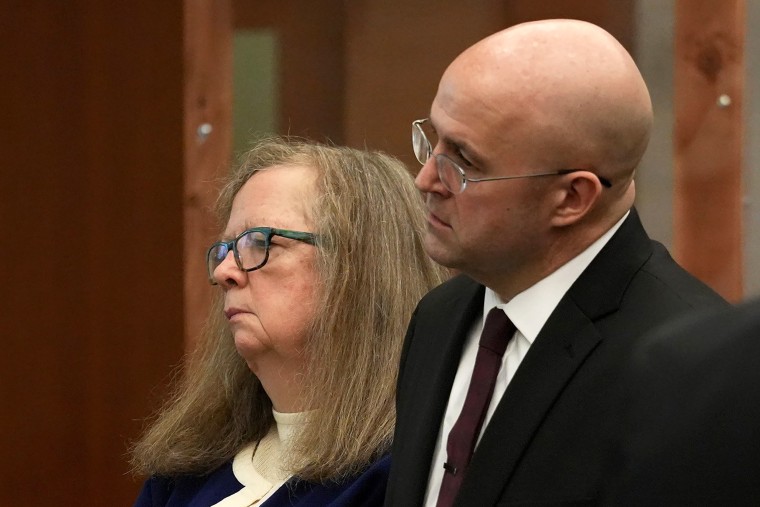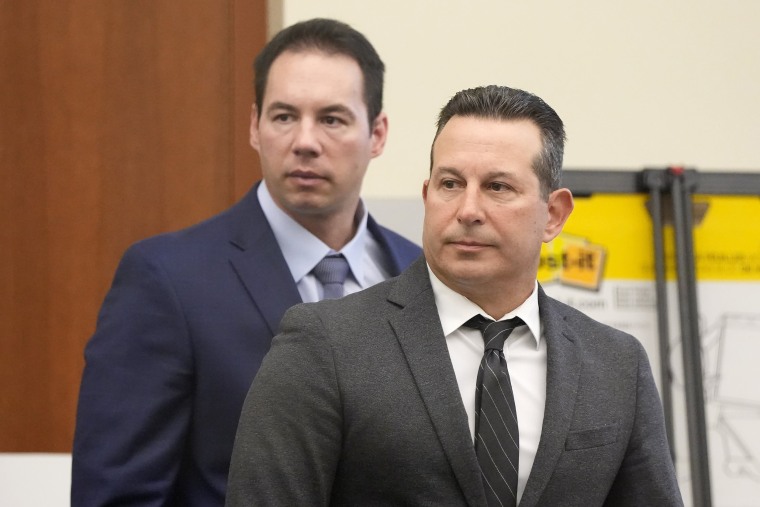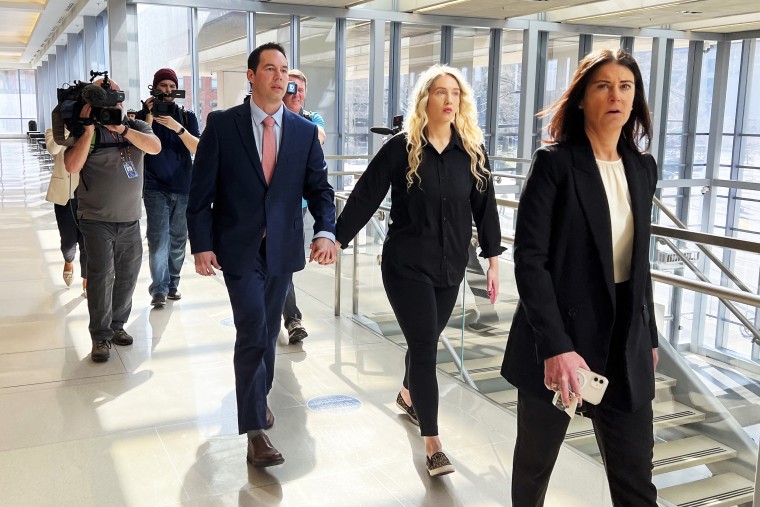During five weeks of grueling testimony in the murder trial of William Husel, Ohio prosecutors introduced 53 witnesses — medical experts, former co-workers and family of deceased patients — in an attempt to convince a jury that Husel, a former hospital physician, intended to kill when he ordered doses of fentanyl for 14 patients.
When the defense presented its case, it called only one witness — a medical expert from Emory University in Atlanta — who cast doubt on the prosecutor’s assertion that excessive levels of the powerful painkiller caused each patient’s death. Rather, he said, they succumbed to underlying health conditions.
In the end, jurors appeared swayed by the defense, finding Husel not guilty of 14 counts of murder on Wednesday in a trial that opened a larger debate about the appropriate use of opioids in end-of-life care, a lack of standards on pain medication and the prosecutions’ decision to even charge a doctor in the first place.
“A textbook can be written on this case,” said Dr. Ziv Cohen, a clinical assistant professor at Cornell University and forensic psychiatrist who has consulted on more than 50 murder cases.
Cohen said medical professionals are entrusted to do no harm, and typically, they can be held accountable by their employers and licensing boards or civilly through malpractice lawsuits. That prosecutors, however, went after a doctor on murder charges for decisions he made in the course of his work he raises questions, Cohen added.
“Was there really enough evidence? In general, we can’t regulate medicine through the criminal courts because we have to think about the public health consequences of doing so,” Cohen said. “It doesn’t mean doctors in some cases are not criminally liable, but they should reserve charges for the most serious.”
Franklin County prosecutors believed these cases were the most serious.
At the heart of their argument: The majority of the 14 patients were given 10 times the amount of fentanyl that would be the norm in a nonsurgical hospital setting, according to medical experts. One patient received a dosage 20 times higher. The patients were treated by Husel, who worked a late-night shift, from 2015 to 2018.
Such amounts were not typical at Mount Carmel Health System in Columbus where Husel worked, so much so that in 2018, two hospital pharmacists reported their concerns to supervisors and the hospital contacted local authorities as well as the patients’ families. Amid the fallout, Husel’s state medical license was suspended in January 2019.
During closing arguments, Assistant Franklin County Prosecutor David Zeyen told the jury that it didn’t matter that most of these patients were already dying or near death in the intensive care unit when Husel decided to prescribe them what can be considered deadly amounts of fentanyl.
“Even though they were very critically ill, and perhaps some of them were on a trajectory to die very soon anyway, you cannot hasten their death, you cannot quickly, painlessly cause the death of a dying person,” Zeyen said. “Can’t do it — not in the state of Ohio.”

But for the jury to convict Husel, the prosecution needed to prove beyond a reasonable doubt that he intended to hasten his patients’ death when he ordered the fentanyl.
“The prosecution’s case on intent hinged on the circumstantial evidence that the amount of fentanyl administered was so high that the only possible explanation was that Husel intended to kill the patients,” Ric Simmons, a former prosecutor who teaches criminal law at Ohio State University, said. “This is a reasonable inference to make, and it was reasonable for the prosecutor to rely on this inference, especially since there was no other evidence of intent.”
But, Simmons said, the jury had to weigh the defense’s argument as well — that Husel’s intent was not malicious, but to reduce the suffering of his patients as part of palliative care.
One of Husel’s attorneys, Jose Baez, also reiterated to jurors that under state law there is no maximum dose of fentanyl and that it must be left up to the doctor’s discretion how much is appropriate in each case.
“When it comes to palliative care, there are no maximum ranges. It’s for the doctor at bedside to make that determination,” Baez said.

Jurors did not speak publicly after the verdict Wednesday.
Michael Benza, a senior professor of law at Case Western Reserve University in Cleveland, said the burden was on the prosecution to show that Husel knew what he was doing and wanted his patients to die beyond the normal course of medical care.
“How much proof did the government really have?” Benza said. “Was this really murder or was it palliative care within the discretion of how to treat my patient that unfortunately had consequences that can include death?”
Even medical professionals can disagree on the proper dosage of painkillers during palliative care, given that it can depend on a variety of factors, such as patients’ size and whether they’ve built up a tolerance over time. Too little a dose may not mask the pain, but too high a dose can be fatal.
In Husel’s case, many of his patients were rushed to the ICU in physical distress, some experiencing organ failure, cancer complications and internal bleeding, and they were being kept alive on ventilators.
Fentanyl, a synthetic opioid, is 80 to 100 times stronger than morphine and 50 times more potent than heroin, according to the Drug Enforcement Administration. In pharmaceutical settings, it is typically used to treat the pain of cancer patients.
But fentanyl has also become a popular street drug, with illegal use leading to a spike in overdose deaths among teenagers in the US over the past two years, according to a recent study.
That prosecutors brought charges against Husel speaks to the current climate of an opioid epidemic that has ravaged families and communities, Cohen said, and that authorities are serious about cracking down on.
With Husel, “it’s important to understand that the fact that he was found not guilty doesn’t mean he was practicing good medicine or that his actions were medically justifiable,” Cohen said. “It really means that there was n’t enough evidence beyond a reasonable doubt that his intent was to commit murder. That is, to hasten their deaths without any legitimate medical purpose.”

After the verdict was read, prosecutors said in a statement that they had accepted the result and acknowledged that the jury “was not convinced beyond a reasonable doubt” of Husel’s guilt.
Franklin County Prosecutor Gary Tyack could not be reached for further comment.
Baez, whose clients have included NFL player Aaron Hernandez, Florida mother Casey Anthony and Hollywood mogul Harvey Weinstein, said despite the jury’s decision, he was “saddened” that a case had been brought against Husel in the first place.
Husel did not comment after his acquittal, and he and his former employer are still facing nearly a dozen civil suits from family members of patients. Several other families settled for about $13.5 million.
“This is a moment, really one of relief as opposed to victory, because of the prospective dangers that this case could have brought to health care professionals and future patients,” Baez said Wednesday.
Cohen said a guilty verdict could have had a chilling effect on how doctors treat their patients, and perhaps leave some to act more cautiously than they might otherwise — to the detriment of their patients — because they don’t want to be criminally charged.
There is a lesson to be learned as well from Husel’s case, he added.
“If you have a good, frank discussion with a patient and their family and document it well and consult with a colleague,” Cohen said, “then it’s very unlikely you’re going to be prosecuted for any medical decision you make.”
www.nbcnews.com
George is Digismak’s reported cum editor with 13 years of experience in Journalism